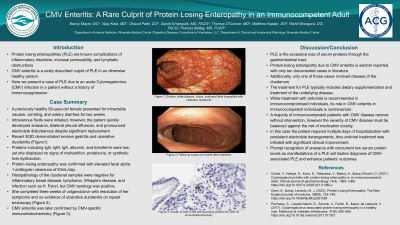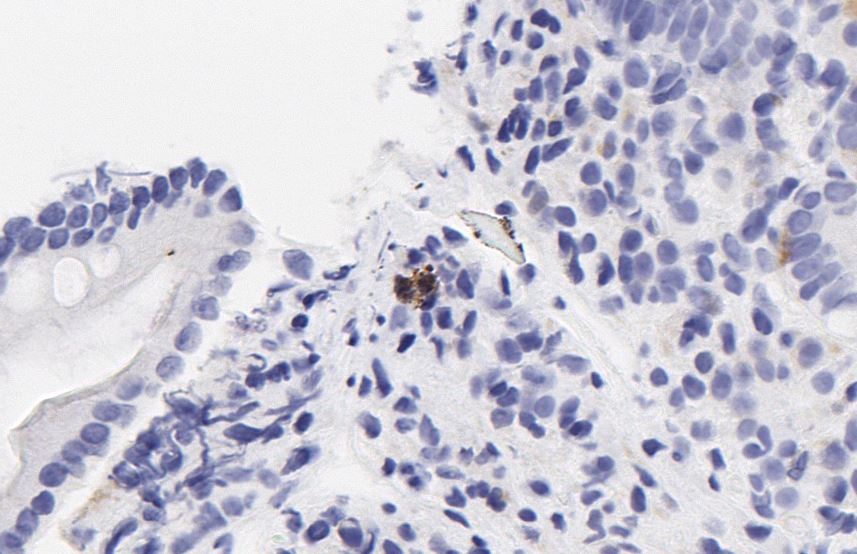Tuesday Poster Session
Category: Small Intestine
P5022 - CMV Enteritis: A Rare Culprit of Protein Losing Enteropathy in an Immunocompetent Adult
Tuesday, October 29, 2024
10:30 AM - 4:00 PM ET
Location: Exhibit Hall E

Has Audio

Nancy Mayer, DO
Riverside Medical Center
Bourbonnais, IL
Presenting Author(s)
Nancy Mayer, DO1, Vijay Kata, MD2, Dhaval Patel, DO1, Thomas Betlej, MD, FCAP1, Daniel Errampalli, MD, FACG3, Thomas O'Connor, MD3, Matthew Kaplan, DO3, Nikhil Bhargava, DO, FACG3
1Riverside Medical Center, Bourbonnais, IL; 2Riverside Medical Group, Bourbonnais, IL; 3Digestive Disease Consultants, Bourbonnais, IL
Introduction: Protein losing enteropathies (PLE) are a known complication of inflammatory disorders, mucosal permeability, and lymphatic obstructions. CMV enteritis is a rarely described culprit of PLE in an otherwise healthy person. We present a case of PLE due to an acute Cytomegalovirus (CMV) infection in a patient without a history of immunosuppression.
Case Description/Methods: A previously healthy 60-year-old female presented for intractable nausea, vomiting, and watery diarrhea for two weeks. Intravenous fluids were initiated, however, the patient quickly developed anasarca, bilateral pleural effusions, and pronounced electrolyte disturbances despite significant replacement. Recent EGD demonstrated erosive gastritis and ulcerative duodenitis. Protein levels including IgG, IgM, IgA, albumin, and transferrin were low. She displayed no signs of malnutrition, proteinuria, or synthetic liver dysfunction. Protein-losing enteropathy was confirmed with elevated fecal alpha 1-antitrypsin clearance of 63mL/day. Histopathology of the duodenal samples were negative for inflammatory bowel disease, lymphoma, Whipple’s disease, and infection such as H. Pylori, but CMV serology was positive. She completed three weeks of valganciclovir with resolution of her symptoms and no evidence of ulcerative duodenitis on repeat endoscopy. CMV enteritis was later confirmed by CMV-specific immunohistochemistry.
Discussion: PLE is the excessive loss of serum proteins through the gastrointestinal tract. Protein-losing enteropathy due to CMV enteritis is seldom reported, with only ten documented cases in literature. Additionally, only one of those cases involved duodenal disease. The treatment for PLE typically includes dietary supplementation and treatment of the underlying disease. While treatment with antivirals is recommended in immunocompromised individuals, its role in CMV enteritis in immunocompetent individuals is controversial. A majority of immunocompetent patients with CMV disease recover without intervention, however the severity of CMV disease must be balanced against the risk of medication toxicity. In this case, the patient required multiple days of hospitalization with persistent electrolyte derangements; thus antiviral treatment was initiated with significant clinical improvement. Prompt recognition of anasarca with concurrent low serum protein levels as manifestations of a PLE will hasten diagnosis of CMV-associated PLE and enhance patients outcomes.

Disclosures:
Nancy Mayer, DO1, Vijay Kata, MD2, Dhaval Patel, DO1, Thomas Betlej, MD, FCAP1, Daniel Errampalli, MD, FACG3, Thomas O'Connor, MD3, Matthew Kaplan, DO3, Nikhil Bhargava, DO, FACG3. P5022 - CMV Enteritis: A Rare Culprit of Protein Losing Enteropathy in an Immunocompetent Adult, ACG 2024 Annual Scientific Meeting Abstracts. Philadelphia, PA: American College of Gastroenterology.
1Riverside Medical Center, Bourbonnais, IL; 2Riverside Medical Group, Bourbonnais, IL; 3Digestive Disease Consultants, Bourbonnais, IL
Introduction: Protein losing enteropathies (PLE) are a known complication of inflammatory disorders, mucosal permeability, and lymphatic obstructions. CMV enteritis is a rarely described culprit of PLE in an otherwise healthy person. We present a case of PLE due to an acute Cytomegalovirus (CMV) infection in a patient without a history of immunosuppression.
Case Description/Methods: A previously healthy 60-year-old female presented for intractable nausea, vomiting, and watery diarrhea for two weeks. Intravenous fluids were initiated, however, the patient quickly developed anasarca, bilateral pleural effusions, and pronounced electrolyte disturbances despite significant replacement. Recent EGD demonstrated erosive gastritis and ulcerative duodenitis. Protein levels including IgG, IgM, IgA, albumin, and transferrin were low. She displayed no signs of malnutrition, proteinuria, or synthetic liver dysfunction. Protein-losing enteropathy was confirmed with elevated fecal alpha 1-antitrypsin clearance of 63mL/day. Histopathology of the duodenal samples were negative for inflammatory bowel disease, lymphoma, Whipple’s disease, and infection such as H. Pylori, but CMV serology was positive. She completed three weeks of valganciclovir with resolution of her symptoms and no evidence of ulcerative duodenitis on repeat endoscopy. CMV enteritis was later confirmed by CMV-specific immunohistochemistry.
Discussion: PLE is the excessive loss of serum proteins through the gastrointestinal tract. Protein-losing enteropathy due to CMV enteritis is seldom reported, with only ten documented cases in literature. Additionally, only one of those cases involved duodenal disease. The treatment for PLE typically includes dietary supplementation and treatment of the underlying disease. While treatment with antivirals is recommended in immunocompromised individuals, its role in CMV enteritis in immunocompetent individuals is controversial. A majority of immunocompetent patients with CMV disease recover without intervention, however the severity of CMV disease must be balanced against the risk of medication toxicity. In this case, the patient required multiple days of hospitalization with persistent electrolyte derangements; thus antiviral treatment was initiated with significant clinical improvement. Prompt recognition of anasarca with concurrent low serum protein levels as manifestations of a PLE will hasten diagnosis of CMV-associated PLE and enhance patients outcomes.

Figure: Cluster of cells in the lamina propria positive for CMV by immunohistochemistry
Disclosures:
Nancy Mayer indicated no relevant financial relationships.
Vijay Kata indicated no relevant financial relationships.
Dhaval Patel indicated no relevant financial relationships.
Thomas Betlej indicated no relevant financial relationships.
Daniel Errampalli indicated no relevant financial relationships.
Thomas O'Connor indicated no relevant financial relationships.
Matthew Kaplan indicated no relevant financial relationships.
Nikhil Bhargava indicated no relevant financial relationships.
Nancy Mayer, DO1, Vijay Kata, MD2, Dhaval Patel, DO1, Thomas Betlej, MD, FCAP1, Daniel Errampalli, MD, FACG3, Thomas O'Connor, MD3, Matthew Kaplan, DO3, Nikhil Bhargava, DO, FACG3. P5022 - CMV Enteritis: A Rare Culprit of Protein Losing Enteropathy in an Immunocompetent Adult, ACG 2024 Annual Scientific Meeting Abstracts. Philadelphia, PA: American College of Gastroenterology.

